Part of a series on the |
|---|
| History of Azerbaijan |
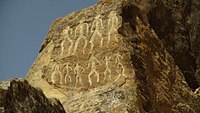 |
| |
Antiquity | Kingdom of Iškuza | c.700 BC–c.590s BC | | Achaemenid Empire | 550 BC–330 BC | | • Satrapy of Media | c.550 BC – 323 BC | | Seleucid Empire | 312 BC – 63 BC | | Parthian Empire | 247 BC – AD 224 | | Caucasian Albania | c.200 BC – c.AD 800 | | Roman Empire | 27 BC – AD 395 |
|
| |
| |
| |
| |
| |
| |
| |
 Azerbaijan portal Azerbaijan portal |
|
Qutqashen Sultanate (Azerbaijani: Qutqaşın sultanlığı) also known as Qabala mahaly (Azerbaijani: Qəbələ mahalı) was feudal state which existed from the middle to the end of 18th century in the north of Azerbaijan, in the territories covering the present day Qabala Rayon.
Historical background
Qabala was ancient capital of the Caucasian Albania. Archeological evidence indicates that the city functioned as the capital of the Caucasian Albania as early as the 4th century BC.[1] Ruins of the ancient town are in 15 km from regional center, allocated on the territory between Garachay and Jourluchay rivers.[2] Qabala was located in the middle of the 2500 old Silk Road and was mentioned in works of Pliny the Younger as "Kabalaka", Greek geographer Ptolemy as "Khabala", Arabic historian Ahmad ibn Yahya al-Baladhuri as "Khazar". In the 19th century, the Azerbaijani historian Abbasgulu Bakikhanov mentioned in his book "Gulistani Irem" that Kbala or Khabala were in fact Qabala. In 60s B.C., Roman troops attacked Caucasian Albania but did not succeed in capturing the Qabala territory. In 262, Caucasian Albania was occupied by Sassanid Empire but preserved its political and economic status. In 464 AD, lost its independence due to years of invasions from the northern nomadic tribes and had to move its capital city to Partava (currently Barda in Azerbaijan). Qabala was occupied by Shirvanshah Fariburz, Georgian tsar David III of Tao in 1120, Mongol khan Timurleng in 1386, Safavid shah Tahmasib I in 1538, Persian Nader Shah in 1734 but was able to preserve its culture and identity. After the death of Nader Shah in 1747, Azerbaijan split into independent khanates and sultanates and Qabala became a sultanate. It was also called Qabala Mahali. After Azerbaijan was occupied by Russian Empire in 1813 it conducted administrative reforms and in 1841 Azerbaijani khanates were terminated and the territories were incorporated into governorates. Qabala sultanate was abolished and area was added to Nukha uyezd of Elisabethpol Governorate. Due to archeological finds in Qabala, it was declared a National State Reserve in 1985.[3][4]
Azerbaijani writer and Imperial Russian general Ismayil bek Kutkashensky was a descendant of Qutqashen Sultans.
Rulers of the sultanate
- Haji Safi Sultan
- Kalbali Sultan, ruled until 1779
- Haji Nasrullah
Picture gallery
-
Khanates of the Caucasus in the 18th and 19th centuries
-
Entering Qabala
-
Ancient Qabala fortress
-
Archeological site of Qabala fortress
-
Archaeological Excavations of Ancient Qabala - Glazed ceramic and ceramic pipe
-
Archeological excavations
-
Archeological excavations in Qabala
-
Ceramic finds
-
Qabala lake
See also
References
- ^ Revisiting History
- ^ History of Gebele city
- ^ Qabala history
- ^ Victory of music in Qabala

 Azerbaijan portal
Azerbaijan portal Khanates of the Caucasus in the 18th and 19th centuries
Khanates of the Caucasus in the 18th and 19th centuries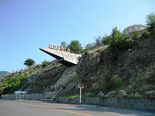 Entering Qabala
Entering Qabala Ancient Qabala fortress
Ancient Qabala fortress Archeological site of Qabala fortress
Archeological site of Qabala fortress Archaeological Excavations of Ancient Qabala - Glazed ceramic and ceramic pipe
Archaeological Excavations of Ancient Qabala - Glazed ceramic and ceramic pipe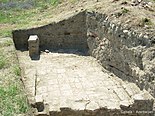 Archeological excavations
Archeological excavations Archeological excavations in Qabala
Archeological excavations in Qabala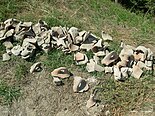 Ceramic finds
Ceramic finds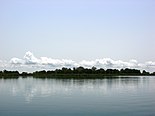 Qabala lake
Qabala lake



















